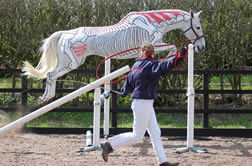Learn to Assess Your Horse's Movement
- Horses Inside Out

- Aug 10, 2021
- 2 min read
Updated: Jun 5, 2024
This series of four online lecture demonstrations will take you on a fascinating journey exploring how equine anatomy and biomechanics can be applied to movement, riding, training and management. If you're interested in improving the comfort and performance of horses, understanding more about how horses move and to reduce the risk of injury this series is for you. And you can access all of this from the comfort of your own home from anywhere in the world!

We begin our journey with Episode 1: The Principles of Movement. This takes place on Wednesday 15 September at 7.30pm (BST) and focuses on the basic anatomy of how the horse moves in walk, trot and canter and how his conformation can affect these gaits.

As you would expect from Horses Inside Out this subject is brought to life by painting the skeleton on one side of my horse Artistic Flair (Arty) and the muscle chains on the other side of him.
This online lecture demonstration will last for approximately two hours and is full of tips and in-hand exercises that you can do with your own horse to help improve his performance. There’s also the opportunity to quiz Gillian Higgins on the topic.
The Anatomy
The first half of the demonstration delves deep into the anatomy of the horse, and I demonstrate how the body works and show the connections within the body by doing some basic in-hand movements using carrots and reflexes. To add another exciting element and to boost your learning of this fascinating subject even further I have bones too – so you’ll get to see how the muscles and bones work in various movements.

The Paces
In the second half you’ll see Arty on the lunge and discuss the biomechanics of how the horse creates walk, trot, canter. You’ll also learn how to assess your horse’s movement – for example, which part of the body should you look at to understand whether your horse is creating a good walk versus a not so good walk.


Polework
The demonstration then looks at the biomechanics of the walk, trot and canter over poles. Arty loves polework and
demonstrates this beautifully – you will be able to look at the skeletal movement in one direction and then focus on the muscular movement and myofascial connection when he's going in the other direction.

Jumping
To finish, Arty jumps a few fences on the lunge to demonstrate the extreme range of movement that happens within the body when a horse jumps. This really highlights how athletic these animals are.
We would really love to join us for this series – you won’t be disappointed.
Tickets cost just £20, or if you sign up for all four it’s £60.





Kommentarer